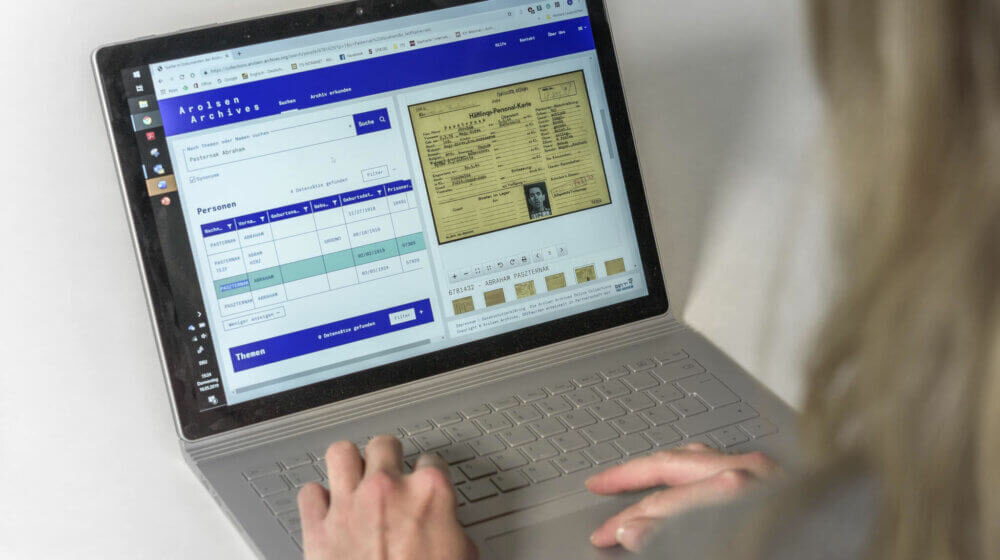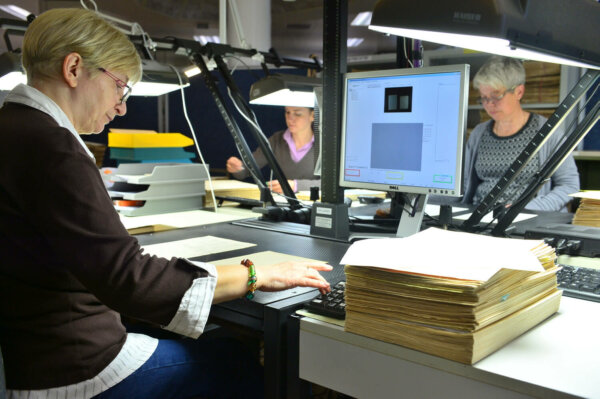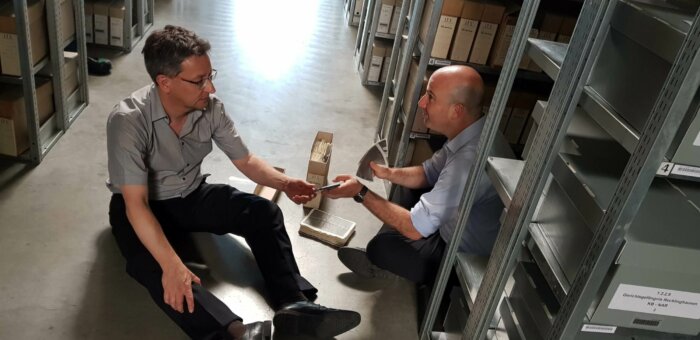Online Research
for Everyone

More than 100,000 views in the first two weeks: the response to our new online archive was overwhelming. Since May 2019, every internet user in the world has had a means of researching the fates of victims of Nazi persecution in our comprehensive database containing millions of documents. A great number of social media comments have shown us how many young people are interested in the topic—especially as it relates to their own family history.
“Unbelievable! I found information and names of relatives of my father’s I never knew about before! Very exciting!”, one user wrote on Facebook. Many interested persons, including journalists, immediately began searching for well-known personages in the online archive. A press editor in Austria, for example, found post-war-period documents on a world-famous poet: in June 1948, Paul Celan (still called Paul Ancel at the time) applied to the International Refugee Organization (IRO) for support for his emigration to France. Another user found documents pertaining to the father of Alexander van der Bellen, the President of Austria, including a handwritten account of his life.
Telescope Into the Past
Assaf Elrom’s grandparents were subjected to persecution and concentration camp imprisonment for being Jewish. In a thank-you letter, the American attorney described how he experienced his search in the online archive:
»I am still thrilled and moved by the documentation that I have found in just a few minutes… I feel that the direct approach to the online archive gives us, the children and grandchildren of the survivors, an unprecedented path to what was left of their lives… It’s a telescope pointed 3,000 miles and 75 years away, and it’s so important that we look through it.«
Assaf Elrom, Jurist, New York
Much discussed idea
The new online archive is a huge milestone on the Arolsen Archives’ road to being an open institution that provides everyone free access to the “memory” of the victims of Nazism and their fates. Nevertheless, there was a lot of discussion about it before it went online. Not only many of our staff members but also external experts questioned whether it is ethically and legally acceptable to publish personal information about Holocaust victims on the internet.


The Arolsen Archives already started putting various sub-categories of the archive online back in 2015—always with the aim of publishing large archival collections on the internet in an ongoing process. To that end, the staff are digitizing millions of documents and assigning them keywords to improve their searchability.
Technological support
One component of a modern online archive was still missing: a highly efficient platform, one that is easy to access and as user-friendly as any present-day search engine. To remedy this shortcoming, the Arolsen Archives entered a partnership with Yad Vashem. The international Holocaust memorial in Israel has at its disposal highly modern technology that supports fast data management and an expanded place and name search function.
»Yad Vashem has been working closely with the Arolsen Archives for nearly half a century. As far back as the 1950s, Yad Vashem made a complete copy of the International Tracing Service’s documentation to gain better access to information on the fates of Jewish victims. Our current partnership unites Yad Vashem’s expertise with the Arolsen Archives’ holdings to promote research on the Holocaust.«
Avner Shalev, Chairman, Yad Vashem
Strategic partnerships
In order to make more and more of our holdings available on the internet, the Arolsen Archives also engage in partnerships with other institutions. The aim is to make the digitized documents completely searchable with all the information they contain. Lists of inmates transported to a certain concentration camp, for example, have to be linked to the respective names, dates and places. This process is complex and expensive. It often requires technical and personnel resources the Arolsen Archives simply don’t have. Since the spring of 2019, we’ve therefore been working with Ancestry, an American company that runs the world’s largest online genealogy platform. Ancestry has more than three million users and is available in more than 30 countries—and it has the means of tagging large archival holdings quickly while at the same time meeting high standards of quality.
This video shows how Ancestry and the Arolsen Archives work together to put the documents online and why the online archive is so important today:
Millions of further documents online
Our cooperation with Ancestry enabled us to make another large sub-collection of our holdings accessible in the online archive in August 2019: “passenger lists” containing information on more than 1.9 million Displaced Persons who left Europe after the war to start new lives for themselves in countries like the U.S.A. and Australia. In November 2019, the online publication process took another major leap forward with 850,000 documents containing information on ten million names—of survivors and victims of the death marches and concentration camps as well as forced laborers. Ancestry is also making the documents available on its own platform. That way, the information from our archives will reach an even larger public worldwide.
The online archive in numbers
With the help of institutions like Ancestry, the Arolsen Archives already put numerous sub-collections of the extensive Bad Arolsen holdings online in 2019. Now we’re working to improve the online archive and develop it further step by step.
*One name is not equivalent to one person: many people were registered in different places with different name spellings.
A look ahead
With new ideas in mind and strong partners at our side, we aim to publish all of the archives’ documents online by 2025, and thus to provide the most extensive research opportunities possible. And not only heavyweights like Ancestry are involved. Since the fall of 2019, we’ve been developing the crowdsourcing project “Every Name Counts” so that anyone can help digitize the information on the documents. In January 2020, the first 1,000 German school pupils tagged the names on deportation lists. After the pilot phase, the project will continue on an international scale.


